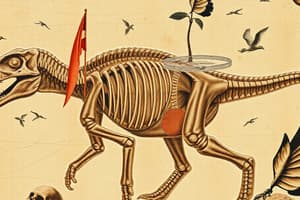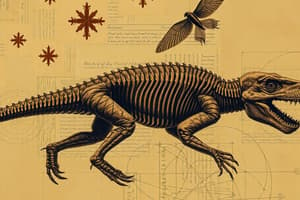Podcast
Questions and Answers
What is the significance of index fossils in geology?
What is the significance of index fossils in geology?
- They are used solely for dating sedimentary rocks.
- They are primarily found in igneous rocks.
- They can correlate rock layers across different locations. (correct)
- They represent only extinct species.
Which principle states that rock fragments included within another rock must be older than the rock containing them?
Which principle states that rock fragments included within another rock must be older than the rock containing them?
- Principle of Original Horizontality
- Principle of Cross-Cutting Relationships
- Principle of Inclusions (correct)
- Principle of Baked Contacts
What does the uppermost occurrence of a fossil on a graph typically indicate?
What does the uppermost occurrence of a fossil on a graph typically indicate?
- The first appearance of the species in history.
- The extinction of the species.
- A major geological event.
- The beginning of an animal's evolution. (correct)
What essential elements primarily compose living organisms?
What essential elements primarily compose living organisms?
Which of the following contributed significantly to the understanding of Earth's age but had inaccurate estimates?
Which of the following contributed significantly to the understanding of Earth's age but had inaccurate estimates?
Which process involves the compression of organic material leaving a thin film of carbon?
Which process involves the compression of organic material leaving a thin film of carbon?
How did Sir William Smith advance the study of geology?
How did Sir William Smith advance the study of geology?
What type of fossil preservation is exemplified by amber trapping insects?
What type of fossil preservation is exemplified by amber trapping insects?
What does the Principle of Cross-Cutting Relationships state?
What does the Principle of Cross-Cutting Relationships state?
What type of sedimentary rock were Paradoxides commonly found in?
What type of sedimentary rock were Paradoxides commonly found in?
Which of the following scientists is recognized for developing principles of stratigraphy?
Which of the following scientists is recognized for developing principles of stratigraphy?
Nicolaus Steno is known for developing which fundamental principles of stratigraphy?
Nicolaus Steno is known for developing which fundamental principles of stratigraphy?
What do trace fossils primarily provide insights into?
What do trace fossils primarily provide insights into?
Which environment is known for preserving detailed fossils, especially of soft body parts?
Which environment is known for preserving detailed fossils, especially of soft body parts?
What is a characteristic of fossilization in tar pits?
What is a characteristic of fossilization in tar pits?
Which fossil exemplifies the diversity of flora from the Upper Carboniferous period?
Which fossil exemplifies the diversity of flora from the Upper Carboniferous period?
What defines Fossil Lagerstätten?
What defines Fossil Lagerstätten?
Which of the following is an example of a Fossil Lagerstätten?
Which of the following is an example of a Fossil Lagerstätten?
What hypothesis did Oparin propose regarding Earth's early atmosphere?
What hypothesis did Oparin propose regarding Earth's early atmosphere?
What was the outcome of the Miller-Urey experiment?
What was the outcome of the Miller-Urey experiment?
Which statement is true about early cellular life?
Which statement is true about early cellular life?
Which elements are collectively known as CHON?
Which elements are collectively known as CHON?
What is the role of catalysts in polymerization during the transition to cellular life?
What is the role of catalysts in polymerization during the transition to cellular life?
Which formation provides evidence of early microbial life?
Which formation provides evidence of early microbial life?
What do agnathans lack that distinguishes them from other vertebrates?
What do agnathans lack that distinguishes them from other vertebrates?
Which of the following correctly describes a major adaptation of reptiles?
Which of the following correctly describes a major adaptation of reptiles?
What is the distinguishing feature of diapsids?
What is the distinguishing feature of diapsids?
How do amphibians primarily reproduce?
How do amphibians primarily reproduce?
What feature provides an advantage for reptiles in reducing water loss?
What feature provides an advantage for reptiles in reducing water loss?
Which of the following is an example of an early diapsid?
Which of the following is an example of an early diapsid?
What type of skeleton do most fish possess?
What type of skeleton do most fish possess?
What does 'double respiration' in amphibians refer to?
What does 'double respiration' in amphibians refer to?
What is the primary feature of a mold in fossilization?
What is the primary feature of a mold in fossilization?
Which process occurs when fluids with high concentrations continue to flow through fossilized remains leading to the formation of new minerals?
Which process occurs when fluids with high concentrations continue to flow through fossilized remains leading to the formation of new minerals?
In which environment is congealment as a fossilization process most likely to occur?
In which environment is congealment as a fossilization process most likely to occur?
What is the result of carbonization in the fossilization of plants and invertebrates?
What is the result of carbonization in the fossilization of plants and invertebrates?
Which type of fossilization involves the complete replacement of a fossil's chemical composition?
Which type of fossilization involves the complete replacement of a fossil's chemical composition?
What happens during the dehydration process in mummification?
What happens during the dehydration process in mummification?
Fossilization in amber is notable for preserving which type of features?
Fossilization in amber is notable for preserving which type of features?
Which statement accurately describes pyritization?
Which statement accurately describes pyritization?
What characterizes the Hadean eon?
What characterizes the Hadean eon?
What significant discovery changed our understanding of Archean rocks?
What significant discovery changed our understanding of Archean rocks?
Which boundary marks the transition from Proterozoic to Phanerozoic eons?
Which boundary marks the transition from Proterozoic to Phanerozoic eons?
Which era is known for the highest extinction event that affected marine species?
Which era is known for the highest extinction event that affected marine species?
What distinguishes the Phanerozoic eon from previous eons?
What distinguishes the Phanerozoic eon from previous eons?
In which era did the Cretaceous/Tertiary event occur?
In which era did the Cretaceous/Tertiary event occur?
What natural process does radioactive decay refer to?
What natural process does radioactive decay refer to?
What is the oldest eon in Earth's history?
What is the oldest eon in Earth's history?
Which eon is characterized by the Cambrian explosion?
Which eon is characterized by the Cambrian explosion?
The Cenozoic Era is divided into which three periods?
The Cenozoic Era is divided into which three periods?
Flashcards
Index Fossils
Index Fossils
Fossils that existed for a short period of time over a wide geographic range, making them valuable for correlating rock layers across different locations.
Biostratigraphy
Biostratigraphy
The study of fossils, including their identification, classification, and distribution, for establishing the relative ages of rock layers.
Stratigraphy
Stratigraphy
The process of establishing the sequence of events in a geological history by examining rock layers and their relationships to each other.
Principle of Original Horizontality
Principle of Original Horizontality
Signup and view all the flashcards
Principle of Lateral Continuity
Principle of Lateral Continuity
Signup and view all the flashcards
Principle of Superposition
Principle of Superposition
Signup and view all the flashcards
Principle of Inclusions
Principle of Inclusions
Signup and view all the flashcards
Principle of Cross-Cutting Relationships
Principle of Cross-Cutting Relationships
Signup and view all the flashcards
Fossil Lagerstätten
Fossil Lagerstätten
Signup and view all the flashcards
Burgess Shale
Burgess Shale
Signup and view all the flashcards
Chengjiang Fauna
Chengjiang Fauna
Signup and view all the flashcards
CHON
CHON
Signup and view all the flashcards
Oparin's Hypothesis
Oparin's Hypothesis
Signup and view all the flashcards
Miller-Urey Experiment
Miller-Urey Experiment
Signup and view all the flashcards
Polymerization
Polymerization
Signup and view all the flashcards
Prokaryotes
Prokaryotes
Signup and view all the flashcards
Paleontology
Paleontology
Signup and view all the flashcards
Body Fossil
Body Fossil
Signup and view all the flashcards
Trace Fossil
Trace Fossil
Signup and view all the flashcards
Carbonization
Carbonization
Signup and view all the flashcards
Fossilization in Amber
Fossilization in Amber
Signup and view all the flashcards
Fossilization in Tar Pits
Fossilization in Tar Pits
Signup and view all the flashcards
High-Quality Fossilization (HQF)
High-Quality Fossilization (HQF)
Signup and view all the flashcards
Hadean
Hadean
Signup and view all the flashcards
Hadean/Archean Boundary
Hadean/Archean Boundary
Signup and view all the flashcards
Archean
Archean
Signup and view all the flashcards
Archean/Proterozoic Boundary
Archean/Proterozoic Boundary
Signup and view all the flashcards
Proterozoic
Proterozoic
Signup and view all the flashcards
Proterozoic/Phanerozoic Boundary
Proterozoic/Phanerozoic Boundary
Signup and view all the flashcards
Phanerozoic
Phanerozoic
Signup and view all the flashcards
Paleozoic Era
Paleozoic Era
Signup and view all the flashcards
Mesozoic Era
Mesozoic Era
Signup and view all the flashcards
Agnathans
Agnathans
Signup and view all the flashcards
Haikouichthys
Haikouichthys
Signup and view all the flashcards
Sacabambaspis
Sacabambaspis
Signup and view all the flashcards
Fishes
Fishes
Signup and view all the flashcards
Dunkleosteus
Dunkleosteus
Signup and view all the flashcards
Macropomides
Macropomides
Signup and view all the flashcards
Amphibians
Amphibians
Signup and view all the flashcards
Reptiles
Reptiles
Signup and view all the flashcards
Replacement Fossilization
Replacement Fossilization
Signup and view all the flashcards
Mineral Replacement
Mineral Replacement
Signup and view all the flashcards
Pyritization
Pyritization
Signup and view all the flashcards
Metasomatism
Metasomatism
Signup and view all the flashcards
Congealment
Congealment
Signup and view all the flashcards
Dehydration (Mummification)
Dehydration (Mummification)
Signup and view all the flashcards
Study Notes
Stratigraphy and Geological Time
- Principle of Layer Superposition: In undisturbed layers, older layers are at the bottom, and younger layers are progressively higher.
- Principle of Layer Successive Formation: Newly formed layers only exist above existing ones at the time of their formation.
- Principle of Original Layer Horizontality: Sediment layers originally accumulate horizontally. Inclined layers indicate later disturbance.
- Principle of Lateral Layer Continuity: Sedimentary layers extend laterally until they thin out at the edge of the depositional basin.
Four Principles
- Principle of Superposition: In undisturbed sedimentary rocks, oldest rocks are at the bottom, and youngest are at the top.
- Principle of Original Horizontality: Sedimentary rocks are initially deposited horizontally. Tilted or folded layers indicate later disturbance.
- Principle of Lateral Continuity: Sedimentary layers extend laterally until they thin out or terminate at the basin boundary.
Interpreting Stratigraphic Successions
- Sedimentological Data: Sediment characteristics (grain size, composition, structures) indicate depositional environment and relative age.
- Structural Features: Folds, faults, and unconformities reveal geologic history and relative ages of rock units.
- Fossils: Fossils correlate rock layers, determine relative and absolute ages, and reconstruct ancient ecosystems.
Relative Ages by Superposition
- Helps determine the relative ages of rocks.
- Sir William Smith pioneered biostratigraphy, using fossils in rocks.
- Fossil ranges can correlate rock layers across different locations.
Important Concepts
- Normal Stratigraphic Succession: Oldest layers at the bottom, youngest at the top.
- Inverted Stratigraphic Succession: Layers are overturned, often due to tectonic activity.
Radioactive Decay
- Radioactive decay is a natural process of unstable isotopes transforming into stable isotopes.
- This process involves radiation emission (alpha, beta, gamma) of particles or energy.
Trace Fossils
- Trace fossils (ichnofossils) are indirect evidence of ancient life (e.g., tracks, trails, burrows, borings).
- Examples include tracks, trails, footprints, worm trails, and holes drilled into rocks or shells by organisms.
Fossil Record 1
- Trace fossils show evidence of ancient life activities (e.g., burrowing, crawling, feeding).
- Examples include tracks, trails, and borings.
- Mixed body and trace fossils preserve both the organism and its trace evidence.
Fossil Record 2
- Fossils preserve ancient life as organic matter, chemical composition, or impressions.
- Processes like carbonization create a thin film of carbon, preserving an organism's shape.
- Impressions leave a negative image in a soft sediment when the organism decays.
Fossilization in Exceptional Environments
- High-quality fossilization (HQF) occurs when rapid burial prevents decay and preserves detailed features.
- Examples include preservation in amber, tar pits, and fossil lagerstätten.
Early Life Evolution
- Early Earth's atmosphere was a reducing one, lacking free oxygen.
- Oparin's hypothesis proposes that inorganic molecules formed complex organic molecules such as amino acids in the early ocean (primordial soup).
- Organic molecules combined through polymerization aided by catalysts to form polymers such as proteins and nucleic acids.
Stromatolites
- Stromatolites are layered rock formations produced by microbial mats, primarily cyanobacteria.
- They are among the oldest known fossils, offering evidence of early life.
- Stromatolites provide evidence of early life, photosynthesis, and oxygenation of the Earth's atmosphere.
Early Eukaryotes
- Bitter Springs Formation: early eukaryotic fossils in Australia.
- Bangiomorpha: early filamentous red algae.
- Torridon Phycus: early green alga.
- Evidence of early animal cells (related to amoebas).
Amphibians and Reptiles
- Amphibians are vertebrates that adapted to life on land but need water for reproduction.
- Reptilian adaptations evolved from amphibians.
- Reptiles developed efficient lungs, amniotic eggs, and scaly skin for terrestrial life.
Dinosaurs
- Saurischians and Ornithischians are two major groups of dinosaurs.
- Saurischians had a pelvic structure similar to lizard hips.
- Ornithischians had a pelvic structure similar to bird hips.
Pterosauria
- Pterosauria are flying reptiles characterized by wings of skin and elongate limbs.
- Pterosaurs likely glided flight, potentially by jumping from elevated platforms.
- Fossil evidence suggests pterosaur diets ranged from fish to insects and small animals.
Evolution of Flight
- Arboreal hypothesis: flight originated from gliding from trees.
- Cursorial hypothesis: running gave rise to flight.
Fossil Lagerstätten
- Rare geological formations where the exceptionally well-preserved fossils with soft body parts are preserved.
- Examples include Burgess Shale and Chengjiang fossils.
Transitional Fossils
- Fossils that show intermediate features between groups (e.g., Archaeopteryx as a transition between dinosaurs and birds).
Plate Tectonics
- Earth's lithosphere is divided into plates that move, interact, and reshape the globe.
- These interactions result in mountain building, earthquakes, and volcano formation.
Stratigraphy
- Study of rock layers (strata) and their relationships.
- Stratigraphy helps to understand Earth's history, including past environmental conditions, organisms, and events.
Studying That Suits You
Use AI to generate personalized quizzes and flashcards to suit your learning preferences.




